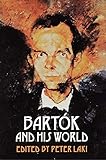Bartók and His World / ed. by Peter Laki.
Material type: TextSeries: The Bard Music Festival ; 6Publisher: Princeton, NJ : Princeton University Press, [2020]Copyright date: ©1996Description: 1 online resource (250 p.) : 6 halftones, 13 music exsContent type:
TextSeries: The Bard Music Festival ; 6Publisher: Princeton, NJ : Princeton University Press, [2020]Copyright date: ©1996Description: 1 online resource (250 p.) : 6 halftones, 13 music exsContent type: - 9780691219424
- MUSIC / History & Criticism
- Ashikaga
- Barthes, Roland
- Bassui Tokusho
- Bishamon
- Bodhisattva Precepts
- Chanyuan qinggui
- Daijōji
- Denkdroku
- Eiheiji
- Eikan
- Ejō
- Famensi
- Four Gates
- Gien
- Gunabhadra
- Gyōki
- Han Yu
- Hanshan Dequing
- Hirata Atsutane
- Jakuen
- Jōjin
- Kakunyo
- Kohō Kakumyō
- Le Goff, Jacques
- Mauss, Marcel
- Mujaku Dochu
- Nāgārjuna
- Prasenajit (King)
- Qingyuan (Xingsi)
- Rujing
- Ryōan Emyōp
- Shasekishū
- Shenhui
- Tambiah, Stanley
- abhiseka
- aniconism
- double
- honji suijaku
- iconoclasm
- imaginaire
- kechimyaku
- manjala
- okibumi
- samädhi
- warrior-monks
- 780/.92 23
- online - DeGruyter
| Item type | Current library | Call number | URL | Status | Notes | Barcode | |
|---|---|---|---|---|---|---|---|
 eBook
eBook
|
Biblioteca "Angelicum" Pont. Univ. S.Tommaso d'Aquino Nuvola online | online - DeGruyter (Browse shelf(Opens below)) | Online access | Not for loan (Accesso limitato) | Accesso per gli utenti autorizzati / Access for authorized users | (dgr)9780691219424 |
Frontmatter -- Contents -- Preface -- Acknowledgments -- Part I. Essays -- Out of Hungary: Bartok, Modernism, and the Cultural Politics of Twentieth-Century Music -- Why Is a Bartok Thematic Catalog Sorely Needed? -- The Gallows and the Altar: Poetic Criticism and Critical Poetry about Bartok in Hungary -- Bartok's Reception in America, 1940-1945 -- Bluebeard as Theater: The Influence of Maeterlinck and Hebbel on Balazs's Bluebeard Drama -- The Miraculous Mandarin: Melchior Lengyel, His Pantomime, and His Connections to Bela Bartok -- Bartok and Stravinsky: Respect, Competition, Influence, and the Hungarian Reaction to Modernism in the 1920s -- Part II. Writings bt Bartόk -- Travel Reports from Three Continents: A Selection of Letters from Béla Bartόk -- Béla Bartόk: An Interview by Dezső Kosztolányi -- A Conversation with Béla Bartόk -- Part III. Writings About Bartόk -- Recollections of Béla Bartόk -- A Change in Style -- Bartόk's Third String Quartet -- Bartόk's Foreign Tour -- Two Bartόk Obituaries -- A Selection of Poems Inspired by Béla Bartόk -- Cantata profana -- With Thundering Steps: Listening to BartόK's Second Piano Concerto -- Joy -- Béla Bartόk -- Bartόk's String Quartet No. 5 -- Bartόk's Farewell -- Bartόk's Homecoming -- Bartόk -- Index of Names and Compositions -- List of Contributors
restricted access online access with authorization star
http://purl.org/coar/access_right/c_16ec
Béla Bartók, who died in New York fifty years ago this September, is one of the most frequently performed twentieth-century composers. He is also the subject of a rapidly growing critical and analytical literature. Bartók was born in Hungary and made his home there for all but his last five years, when he resided in the United States. As a result, many aspects of his life and work have been accessible only to readers of Hungarian. The main goal of this volume is to provide English-speaking audiences with new insights into the life and reception of this musician, especially in Hungary. Part I begins with an essay by Leon Botstein that places Bartók in a large historical and cultural context. László Somfai reports on the catalog of Bartók's works that is currently in progress. Peter Laki shows the extremes of the composer's reception in Hungary, while Tibor Tallián surveys the often mixed reviews from the American years. The essays of Carl Leafstedt and Vera Lampert deal with his librettists Béla Balázs and Melchior Lengyel respectively. David Schneider addresses the artistic relationship between Bartók and Stravinsky. Most of the letters and interviews in Part II concern Bartók's travels and emigration as they reflected on his personal life and artistic evolution. Part III presents early critical assessments of Bartók's work as well as literary and poetic responses to his music and personality.
Mode of access: Internet via World Wide Web.
In English.
Description based on online resource; title from PDF title page (publisher's Web site, viewed 27. Jan 2023)


